Zeeshan Akhtar
Projection-Free Algorithm for Stochastic Bi-level Optimization
Oct 22, 2021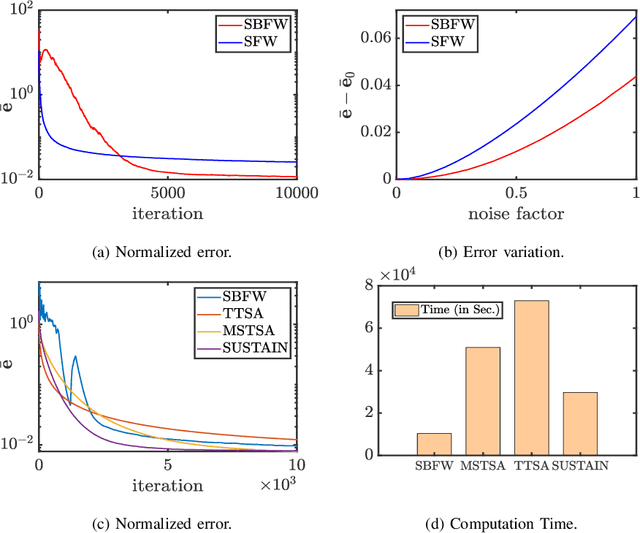
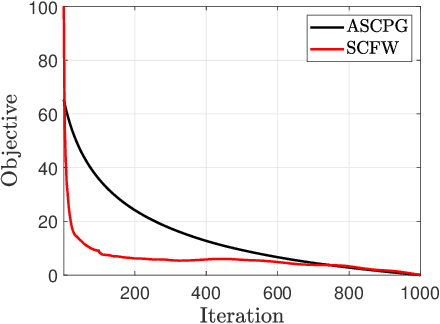
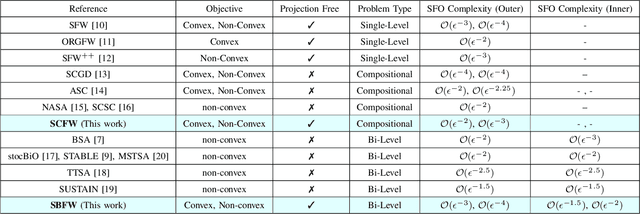
Abstract:This work presents the first projection-free algorithm to solve stochastic bi-level optimization problems, where the objective function depends on the solution of another stochastic optimization problem. The proposed $\textbf{S}$tochastic $\textbf{Bi}$-level $\textbf{F}$rank-$\textbf{W}$olfe ($\textbf{SBFW}$) algorithm can be applied to streaming settings and does not make use of large batches or checkpoints. The sample complexity of SBFW is shown to be $\mathcal{O}(\epsilon^{-3})$ for convex objectives and $\mathcal{O}(\epsilon^{-4})$ for non-convex objectives. Improved rates are derived for the stochastic compositional problem, which is a special case of the bi-level problem, and entails minimizing the composition of two expected-value functions. The proposed $\textbf{S}$tochastic $\textbf{C}$ompositional $\textbf{F}$rank-$\textbf{W}$olfe ($\textbf{SCFW}$) is shown to achieve a sample complexity of $\mathcal{O}(\epsilon^{-2})$ for convex objectives and $\mathcal{O}(\epsilon^{-3})$ for non-convex objectives, at par with the state-of-the-art sample complexities for projection-free algorithms solving single-level problems. We demonstrate the advantage of the proposed methods by solving the problem of matrix completion with denoising and the problem of policy value evaluation in reinforcement learning.
Zeroth and First Order Stochastic Frank-Wolfe Algorithms for Constrained Optimization
Jul 14, 2021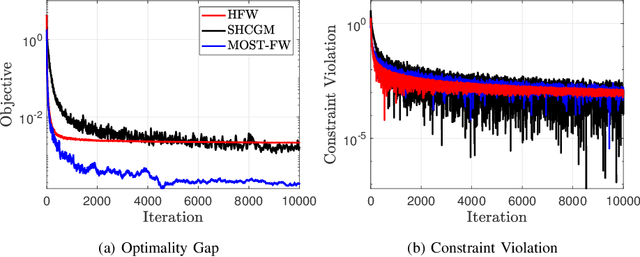
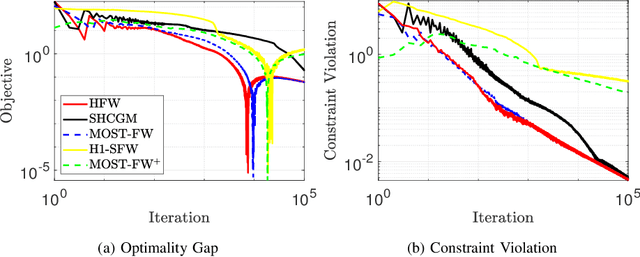
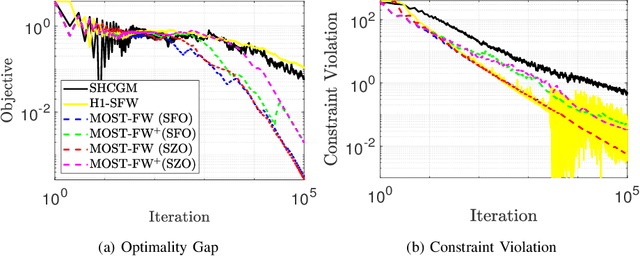
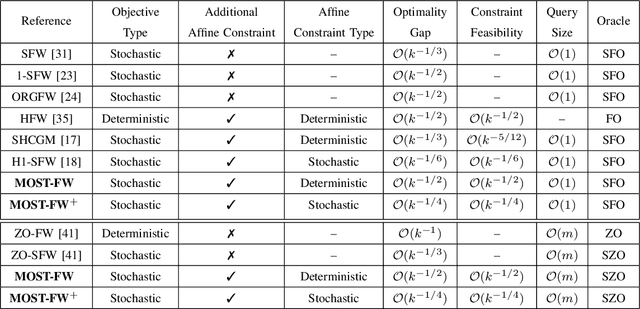
Abstract:This paper considers stochastic convex optimization problems with two sets of constraints: (a) deterministic constraints on the domain of the optimization variable, which are difficult to project onto; and (b) deterministic or stochastic constraints that admit efficient projection. Problems of this form arise frequently in the context of semidefinite programming as well as when various NP-hard problems are solved approximately via semidefinite relaxation. Since projection onto the first set of constraints is difficult, it becomes necessary to explore projection-free algorithms, such as the stochastic Frank-Wolfe (FW) algorithm. On the other hand, the second set of constraints cannot be handled in the same way, and must be incorporated as an indicator function within the objective function, thereby complicating the application of FW methods. Similar problems have been studied before, and solved using first-order stochastic FW algorithms by applying homotopy and Nesterov's smoothing techniques to the indicator function. This work improves upon these existing results and puts forth momentum-based first-order methods that yield improved convergence rates, at par with the best known rates for problems without the second set of constraints. Zeroth-order variants of the proposed algorithms are also developed and again improve upon the state-of-the-art rate results. The efficacy of the proposed algorithms is tested on relevant applications of sparse matrix estimation, clustering via semidefinite relaxation, and uniform sparsest cut problem.
Conservative Stochastic Optimization with Expectation Constraints
Aug 13, 2020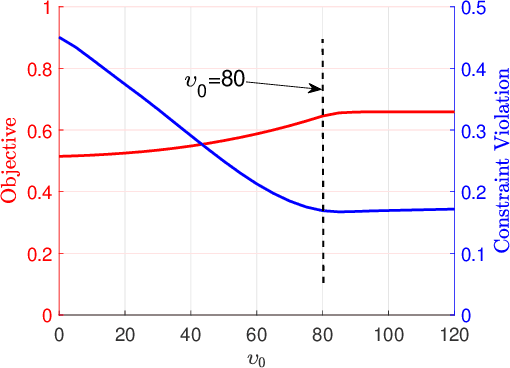

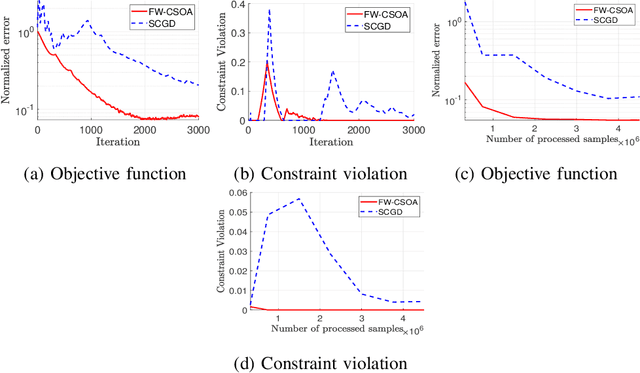
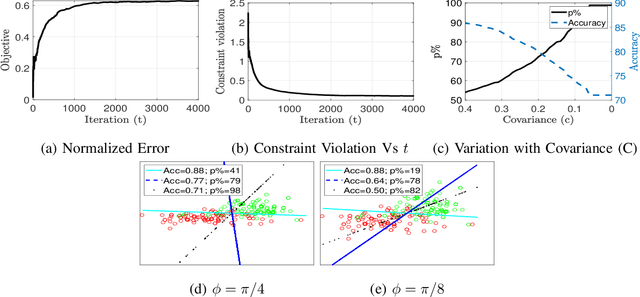
Abstract:This paper considers stochastic convex optimization problems where the objective and constraint functions involve expectations with respect to the data indices or environmental variables, in addition to deterministic convex constraints on the domain of the variables. Although the setting is generic and arises in different machine learning applications, online and efficient approaches for solving such problems have not been widely studied. Since the underlying data distribution is unknown a priori, a closed-form solution is generally not available, and classical deterministic optimization paradigms are not applicable. State-of-the-art approaches, such as those using the saddle point framework, can ensure that the optimality gap as well as the constraint violation decay as $\O\left(T^{-\frac{1}{2}}\right)$ where $T$ is the number of stochastic gradients. The domain constraints are assumed simple and handled via projection at every iteration. In this work, we propose a novel conservative stochastic optimization algorithm (CSOA) that achieves zero constraint violation and $\O\left(T^{-\frac{1}{2}}\right)$ optimality gap. Further, the projection operation (for scenarios when calculating projection is expensive) in the proposed algorithm can be avoided by considering the conditional gradient or Frank-Wolfe (FW) variant of the algorithm. The state-of-the-art stochastic FW variants achieve an optimality gap of $\O\left(T^{-\frac{1}{3}}\right)$ after $T$ iterations, though these algorithms have not been applied to problems with functional expectation constraints. In this work, we propose the FW-CSOA algorithm that is not only projection-free but also achieves zero constraint violation with $\O\left(T^{-\frac{1}{4}}\right)$ decay of the optimality gap. The efficacy of the proposed algorithms is tested on two relevant problems: fair classification and structured matrix completion.
 Add to Chrome
Add to Chrome Add to Firefox
Add to Firefox Add to Edge
Add to Edge